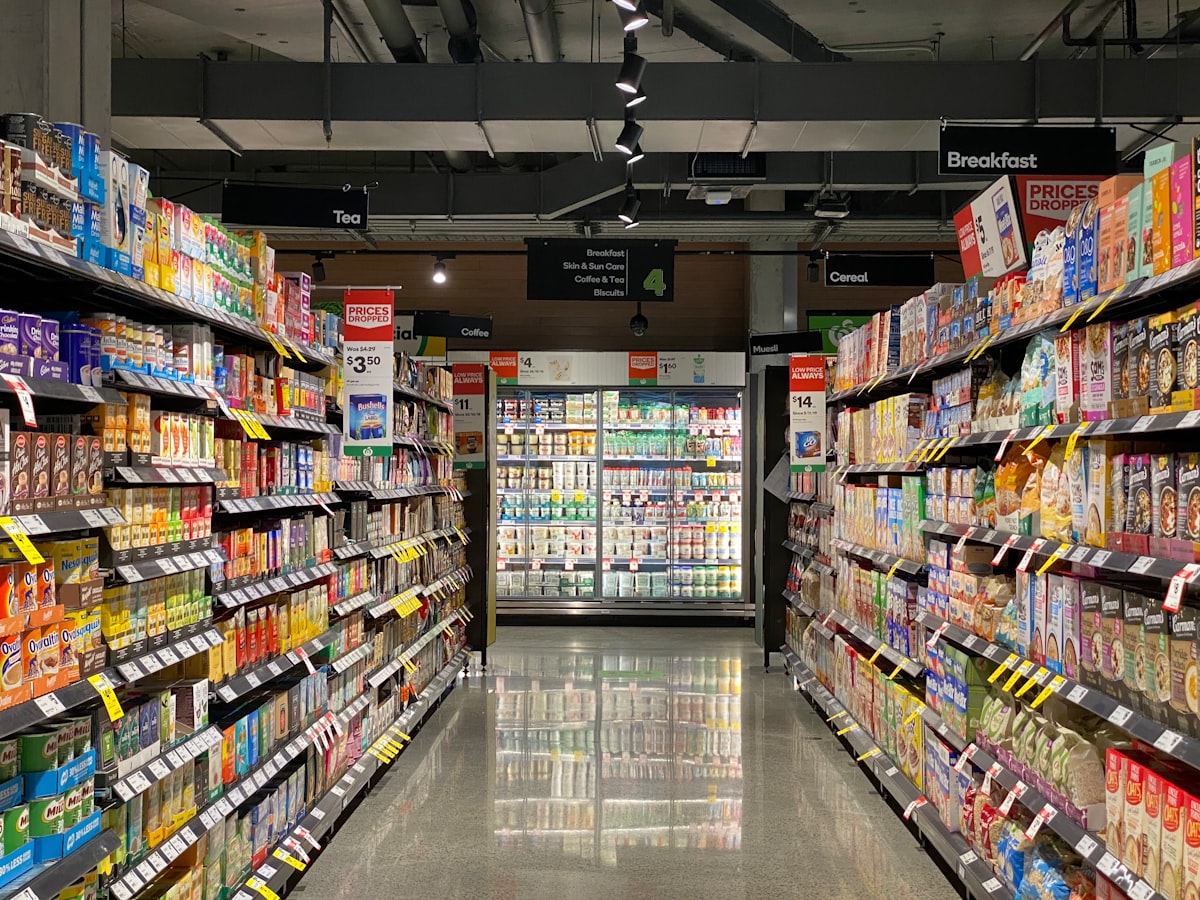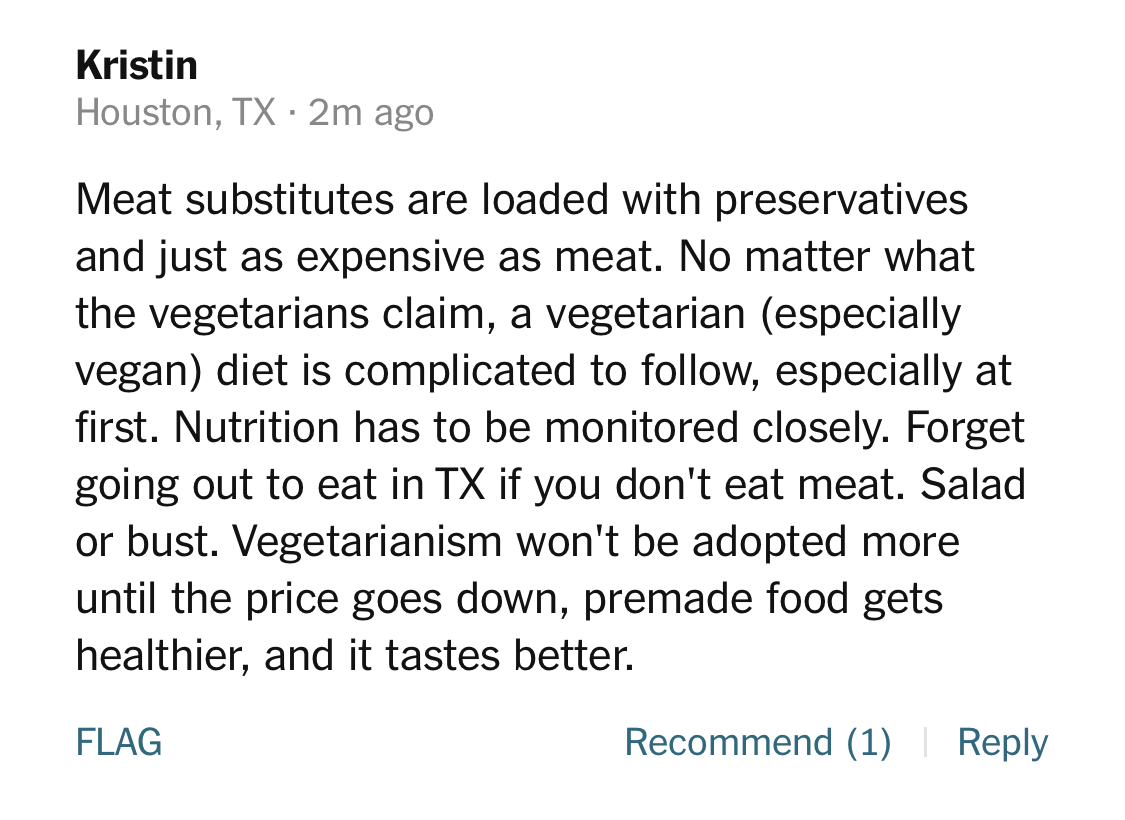You Are What You Eat

Nearly every year, I go through a process of reevaluating my vegetarianism. For some, that’s problematic to say or write publicly. But the truth is, we all should reserve the right to be critical of the choices we make and continue to make. Socrates said it best: “The unexamined life is not worth living.”
Still, I've been a vegetarian for more than 12 years. I remember the dour looks on friends and family members faces when I landed the news before holiday get togethers. I recall people telling me that it was a fad. That I’d be off the bandwagon with one whiff of Chik-fil-a. And the evangelists of meat, from crossfitters and a naturopath chiropractor, wasted hours with me extolling the virtues of animal protein for physical and mental fitness.
In every case, I'd smile, nod, and shrug it off. I don't kill animals. I can live without meat. I have enough resolve to withstand the pressure of peers. More beans and lentils, please.
Yet as time goes by, I find myself asking more critical questions. Are fake meats with their preservatives trustworthy? If I can afford high quality organic meats, wouldn’t that be healthier? If the animals are treated well before they're killed, does that make it okay? How would I even know? Am I tired of the inconvenience in social settings or when traveling? Is having part of my identity tied to what I eat – or not eat – actually not healthy?
Identity. That’s an interesting word. It’s why, regardless of the answers to any of these questions, it is so difficult to stop being a vegetarian. Identity is solidified through action. It’s an academic way of saying what kind of person you are. For me, I’m the kind of person who doesn’t eat animals. This way of being is part of who I am.
We are literally what we eat. We are sustained – or not – by the nutrients, compounds, synthetics, and preservatives we put into our bodies.
It is also true that we are symbolically what we eat. Every food choice says something about who we are. Every choice is a vote and, whether made explicitly or implicitly, reinforces our identities. Every action is a vote for the type of person we want to be. What we eat is part of who we are.
What kind of person are you?
We can see identity show up in food culture easily. It usually appears in short “I am” statements.
I am a vegetarian. I'm paleo. I'm a foodie. These types of statements are a reflection of values. They are loaded with meaning beyond the one word. They project an identity to the people around us. These types of statements reinforce what you believe about yourself and tell the world the kind of person you are.
These identities do not appear out of nowhere. They solidify through action. When we explicitly make the choice day after day to not eat meat, we become vegetarian. When we’re convinced that our ancestors diets were superior to the current mainstream American diet, we choose to be paleo. Identities form when we consistently make choices that align to our values.
How we choose what to eat
Every choice filters through our values. These values translate to a set of decision frames we consider (implicitly or excplicitly) as we eat, shop, or make plans. Each of us has values that frame the decisions we make. While we filter all of our decisions, I’m particularly interested in how we choose what we eat.
There are 6 primary decision frames when it comes to choosing food. Most people probably aren’t actively thinking about each of these at every turn down the grocery aisle. In many cases, they become involuntary or taken for granted. Others become dominant lenses through which every choice is filtered. This is how food identities form.
- Cost: How much money am I willing or able to spend?
- Convenience: How much time and effort am I willing to put in?
- Culture: What are the social norms or family traditions I should uphold?
- Purity: How natural or true to whole ingredient is this food?
- Ethics: How does this food impact the earth, climate, animal welfare, or the people who produced it?
- Aesthetics: How will it taste, smell, and look?
For most of history, I'd argue people didn't consider more than 2-3 of these factors. But that has all changed. We're a more educated and informed society now. Most people are likely aware of all these factors to some degree. And food marketers have become keenly aware of how to use these decision frames and values to attract customers.
It's not hard to find an article or essay on any given day in a mainstream publication about the foods we eat and the aspects listed above. Take this one from The NY Times: https://www.nytimes.com/2021/03/06/opinion/sunday/beef-meatless-burger.html
Though the article mostly focuses on the ethics of meat, the comments are rife with people extolling the virtues of other values - both in favor and against traditional meat.

The reality is that no one puts 100 percent of their focus on any of these decision frames. Every choice requires weighing multiple values. These aren’t black and white decision. As eaters, we consider some, if not all, of these values and assign some weight to it. We become quick at making these decisions over and over. Soon the decisions become rote or ingrained. The Aesthetic states simply, “I am a foodie.” The Ethicist becomes a vegan. The cost conscious turn extreme couponers.
Ultimately, our food choices are influenced by our environment, health, histories, friend groups, religion, politics, morals, finances, and lifestyle. This is why Matt Frazier originally left Baltimore for Asheville. It’s why health outcomes are so poor in low income neighborhoods. It’s why researchers urge food marketers to appeal to communities, not individuals.
These influences tip the scales one way or another while we’re staring at a menu or planning weekly dinners. How we choose what to eat is a function of the kind of person we are when we're not eating.
Food choice also implies a certain amount of privilege. Not everyone can afford pure food. Millions of people don’t have access to ethically sourced options. Some cultures value foods that are objectively less healthy. These are constraints that prevent some people from fully controlling their food choices.
